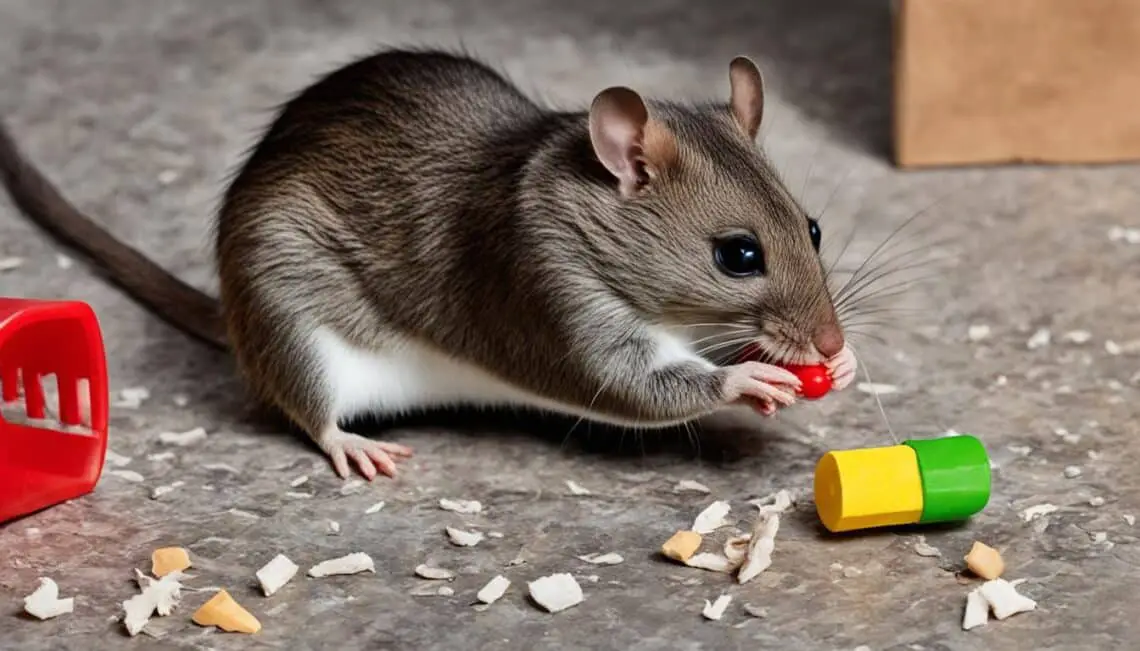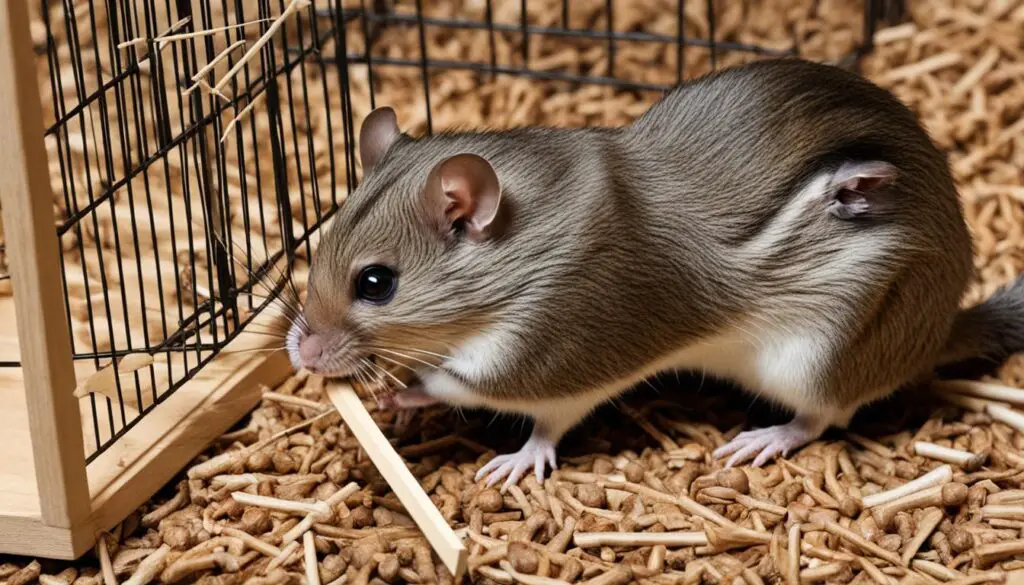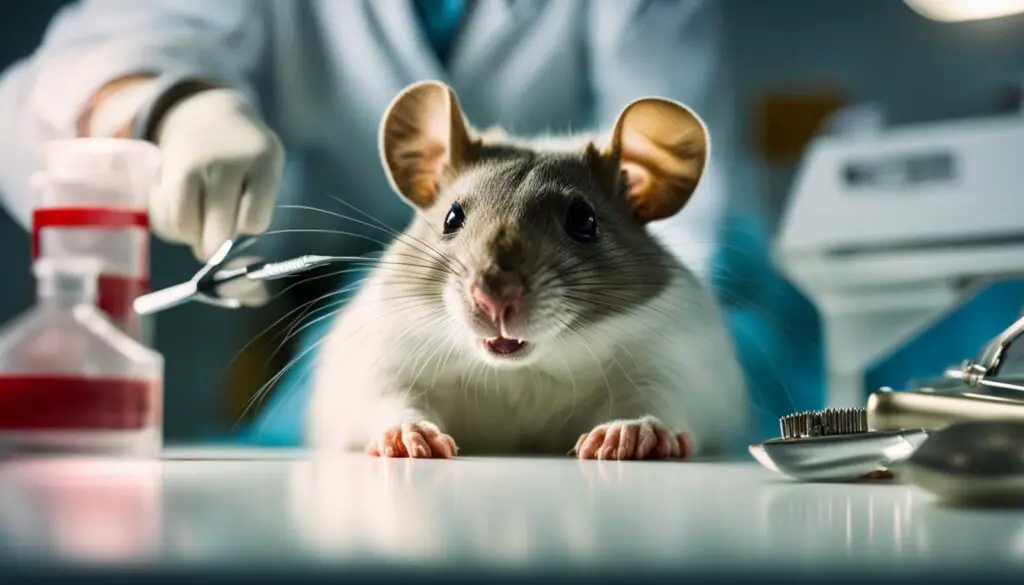Rodents, such as rats and mice, have a natural instinct to chew on objects to keep their constantly growing incisors trimmed. However, this destructive chewing behavior can cause damage to furniture, fabrics, electrical wires, and more. In this article, I will explore effective strategies to stop destructive chewing in rodents, providing pet owners with solutions and tips to prevent damage in their homes.
Key Takeaways:
- Understanding the reasons behind rodent chewing behavior is crucial in addressing the issue effectively.
- Providing appropriate chew toys and mental stimulation can help prevent destructive chewing inside the rodent’s cage.
- When allowing rodents to roam outside their cage, closely monitor them and offer acceptable alternatives if they start chewing on inappropriate items.
- Regular veterinary check-ups are essential to detect any underlying medical conditions that may contribute to excessive chewing.
- By implementing these strategies and seeking professional advice, pet owners can create a safe and stimulating environment for their rodents while minimizing the risk of damage to their homes.
Understanding Rodents’ Chewing Behavior
Rodents, including pet rats, exhibit a range of behaviors when it comes to chewing. It is essential to understand the reasons behind their destructive chewing habits in order to address them effectively. By identifying the underlying causes, pet owners can implement the appropriate strategies to prevent damage and ensure the well-being of their furry friends.
Why do rodents chew?
There are several reasons why rodents engage in chewing behavior:
- Lack of appropriate chew toys: Rodents have a natural instinct to chew in order to keep their constantly growing incisors trimmed. Without access to suitable chew toys, they may resort to chewing on fabric items in their cage.
- Need for exercise and mental stimulation: Rodents are highly active animals that require ample physical and mental stimulation. Chewing serves as a way for them to release energy and keep their minds engaged.
- Age-related chewing habits: Older rodents may exhibit more pronounced chewing behavior due to age-related dental issues. Their teeth may become misaligned or overgrown, leading to increased chewing activity.
Understanding these reasons is crucial in developing effective strategies to address rodent chewing behavior.
Reasons for rodent chewing: The Science Behind It
“Chewing behavior in rodents is primarily driven by their dental needs and natural instincts. Their incisors grow continuously, and they need to wear them down to maintain proper dental health. Chewing provides rodents with exercise, mental stimulation, and helps prevent dental problems. It is essential to provide appropriate chew toys and regularly monitor their dental health to prevent destructive chewing behavior.” – Dr. Lisa Adams, Rodent Behavior Specialist
By understanding the reasons behind rodent chewing habits, pet owners can take proactive steps to prevent destructive chewing and ensure the well-being of their furry companions. In the next section, we will explore effective strategies for preventing chewing inside the rodent’s cage.
Tips for Preventing Chewing Inside the Cage
To prevent chewing inside the rodent cage and protect your furniture and belongings, it’s important to implement chew-proofing strategies. Here are some useful tips:
1. Provide Suitable Chew Toys
Offering a variety of suitable chew toys is essential to redirect your rodent’s chewing behavior. Willow sticks and bamboo chews are excellent options as they are durable and safe for rodents to gnaw on. These toys help satisfy their natural instinct to chew without causing any harm. Regularly check the toys for signs of wear and replace them when necessary to ensure optimal chewing enjoyment.
2. Switch to Cardboard Hideouts
Instead of using fabric items such as hammocks or tunnels in the cage, consider switching to cardboard hideouts. Fabric can be enticing for rodents to chew on, leading to destruction. Cardboard provides a safe alternative as it allows them to indulge their chewing instincts without causing significant damage. Plus, it’s fun for them to explore and shred! Just ensure the cardboard hideouts are free from any adhesives or staples that could be harmful if ingested.
3. Opt for Plain Shredded Newsprint as Bedding
Choosing the right bedding material is crucial to prevent chewing inside the cage. Plain shredded newsprint is a safe and economical option that offers a cozy and comfortable environment for your rodents. This type of bedding is less likely to stimulate their chewing behavior compared to materials like fabric or wood shavings.
4. Introduce Food Puzzles for Mental Stimulation
Keeping your rodents mentally stimulated can help distract them from destructive chewing. Food puzzles are a great way to engage their minds while satisfying their hunger. These puzzles require them to work for their treats, providing both mental stimulation and a rewarding chewing experience. You can find a variety of food puzzles designed for rodents at pet supply stores or create DIY versions using items like cardboard tubes or egg cartons.
5. Regular Veterinary Check-ups
Regular visits to the veterinarian are essential to detect any underlying medical conditions that may contribute to excessive chewing. Some health issues, such as dental problems or nutritional deficiencies, can lead to increased chewing behavior. A veterinarian experienced in rodent care will be able to assess your pet’s overall health and provide appropriate guidance and treatment if needed.
By implementing these tips, you can prevent destructive chewing inside the rodent cage and create a safe and stimulating environment for your furry friends.
Strategies for Redirecting Chewing Outside the Cage
When allowing rodents to roam outside their cage, it’s essential to closely monitor them and take precautions to prevent destructive chewing. Here are some effective strategies to redirect rodent chewing behavior and protect valuable items in your home:
1. Remove Inappropriate Items
If a rodent starts chewing on something it shouldn’t, promptly remove the item from their reach. This will help prevent further damage and reinforce the idea that those objects are not suitable for chewing.
2. Offer Acceptable Alternatives
Provide your rodent with appropriate chew toys and items to redirect their chewing behavior. Cardboard, wood chews, or plastic baby toys can serve as excellent alternatives to satisfy their natural urge to chew.
3. Use Chew-Deterrent Methods
Peppermint essential oil or extract can act as a natural deterrent for rodents. Apply a small amount to objects that you want to protect from chewing. The strong scent of peppermint can discourage rodents from approaching or chewing on those items.
By implementing these redirecting strategies and offering suitable alternatives, you can effectively train your rodents not to chew on inappropriate objects. Remember to provide a stimulating environment with plenty of enrichment and toys to keep them mentally and physically engaged.
Understanding the Importance of Rodent Veterinarian Care
Regular veterinary check-ups are essential for rodent health and to detect any underlying medical conditions that can contribute to excessive chewing. It is crucial for pet owners to prioritize veterinary care for their rodents to ensure their overall well-being.
During these routine check-ups, veterinarians can conduct thorough rodent health check-ups, assessing their physical condition, behavior, and vital signs. They can also look for signs of underlying medical conditions that may manifest as destructive chewing behavior.
Some common signs of underlying medical conditions in rodents that pet owners should be aware of include:
- Changes in appetite or weight loss
- Lethargy or reduced activity levels
- Unusual aggressive behavior
- Difficulty breathing or wheezing
- Hair loss or skin abnormalities
If any of these signs are observed, it is important to consult a veterinarian experienced in rodent care immediately. Prompt identification and treatment of underlying medical conditions can significantly improve the health and well-being of rodents.
A qualified veterinarian can provide the necessary guidance and recommend suitable treatment options based on the specific medical condition and needs of the rodent. They may suggest diagnostic tests, prescribe medications, or advise on dietary changes to address the underlying health issues.
Regular veterinary check-ups ensure that the overall health of rodents is monitored, and any potential medical conditions are detected early.
In addition to addressing medical conditions, veterinarians can provide valuable advice on preventive measures to maintain optimal rodent health. They can recommend suitable diets, proper cage hygiene practices, and environmental enrichment activities to keep rodents physically and mentally stimulated.
Remember, providing regular veterinary care and addressing any underlying medical conditions is key to promoting a healthy and happy life for your rodents.
| Benefits of Regular Veterinary Check-ups for Rodents | Why It Matters |
|---|---|
| Early detection of medical conditions | Allows for timely intervention and treatment |
| Professional guidance on rodent care | Ensures the implementation of appropriate preventive measures |
| Prevention of potential health issues | Promotes overall well-being and quality of life |
| Long-term cost savings | Prevents expensive treatments due to neglected medical conditions |
Conclusion
Destructive chewing in rodents can be a frustrating behavior for pet owners, but there are effective strategies to stop and redirect this behavior. By implementing the right techniques, you can create a safe and stimulating environment for your rodents while minimizing the risk of damage to your home.
One crucial aspect of preventing rodent chewing is providing appropriate chew toys. Willow sticks, bamboo chews, and other safe chew toys can satisfy your rodents’ natural instinct to chew and keep their teeth healthy. Regularly rotating and introducing new chew toys will help prevent boredom and keep your rodents engaged.
In addition to chew toys, regular exercise and mental stimulation are vital for rodents. Providing plenty of opportunities for exercise, such as using exercise wheels or creating obstacle courses, will help channel their energy in a positive way. Mental stimulation can be achieved through food puzzles or hiding treats to keep your rodents mentally engaged.
However, it is equally important to address any underlying medical conditions that may contribute to excessive chewing. Regular veterinary check-ups are essential to identify and treat any health issues your rodent may have. Consulting a veterinarian experienced with rodents will ensure personalized advice and proper care for your pets.
FAQ
How can I stop destructive chewing in rodents?
To stop destructive chewing in rodents, provide appropriate chew toys, regular exercise and mental stimulation, and address any underlying medical conditions.
Why do rodents chew?
Rodents, such as rats and mice, have a natural instinct to chew on objects to keep their constantly growing incisors trimmed. They may also chew due to a lack of appropriate chew toys, the need for more exercise and mental stimulation, or age-related habits.
What can I do to prevent chewing inside the rodent cage?
To prevent chewing inside the rodent cage, provide a variety of chew toys such as willow sticks and bamboo chews, avoid fabric items as bedding, and introduce food puzzles for mental stimulation.
How can I redirect chewing behavior outside the cage?
When allowing rodents to roam outside the cage, closely monitor them and keep valuable items out of reach. If a rodent starts chewing on something inappropriate, remove the item and offer an acceptable alternative, such as cardboard, wood chews, or plastic baby toys. Peppermint essential oil or extract can be used as a deterrent.
Why is veterinary care important for rodents?
Regular veterinary check-ups are essential for rodents to ensure their overall health and detect any underlying medical conditions that may contribute to excessive chewing. Medical conditions, such as hyperactivity or pituitary tumors, can manifest as destructive chewing behavior.







No Comments